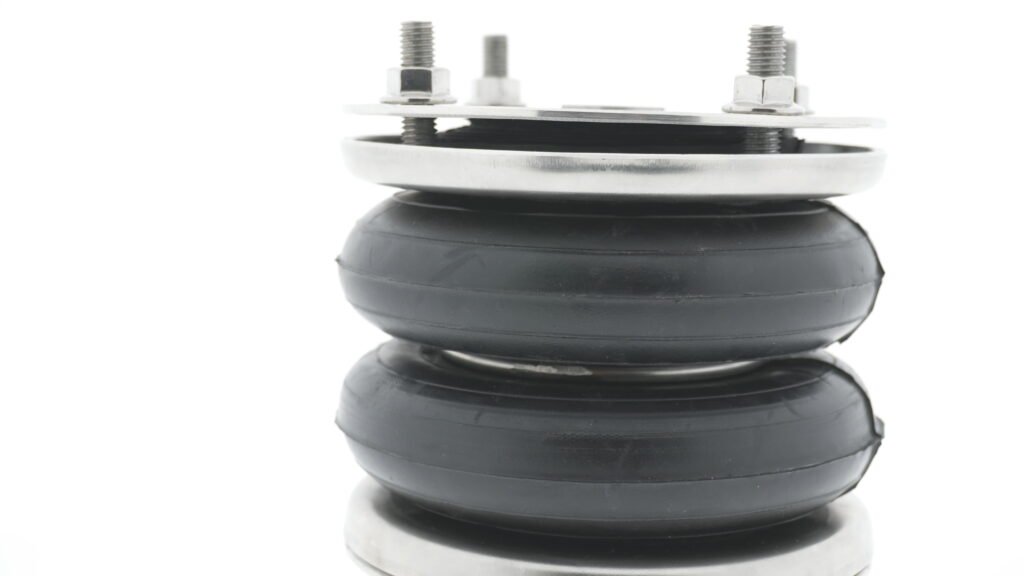
Industrial noise pollution is a significant challenge in many manufacturing and processing facilities. The constant operation of heavy machinery, vibrations, and structural transmissions contribute to excessive noise levels that can impact worker safety, productivity, and compliance with environmental regulations. One of the most effective solutions for mitigating these noise disturbances is the integration of air bellows into industrial applications. These flexible actuators offer superior vibration isolation, noise reduction, and shock absorption, making them indispensable in various industries. Air bellows can reduce transmitted noise by up to 99%, depending on system configuration. The natural frequency of these components can range from 1.2 Hz to 3.0 Hz, ensuring superior performance. Load capacities vary from 0.5 kN to 450 kN, allowing compatibility with various industrial setups. The use of high-strength rubber composites enhances longevity and durability in harsh environments.
How Air Bellows Reduce Noise Pollution
1. Vibration Isolation for Machinery
Industrial equipment generates significant levels of mechanical vibrations, which are a primary source of noise pollution. Air bellows, with their ability to absorb vibrations, play a crucial role in isolating machinery from its surroundings. By incorporating air suspension systems, industries can achieve:
- Reduced structure-borne noise by up to 90%
- Minimized wear and tear on components
- Enhanced equipment longevity due to reduced friction
- Improved working conditions for operators
Air bellows offer a stroke range between 10 mm and 300 mm, allowing effective operation across diverse machinery. The adjustable internal air pressure (up to 12 bar) enables precise control over vibration damping. Additionally, stainless steel AISI-304 and AISI-316 options ensure compatibility with harsh industrial environments, including exposure to chemicals and extreme temperatures (-40°C to +115°C).
2. Damping Shock Waves
Many industrial processes involve sudden impacts or shock loads, such as those found in pressing, stamping, and conveyor systems. Air bellows act as natural shock absorbers, preventing resonance buildup and reducing peak noise levels. Their ability to compress and expand with minimal resistance allows them to dissipate energy effectively, making them an essential component in noise-sensitive applications.
Tests show that air bellows reduce peak force transmission by up to 85% in dynamic loading scenarios. The four-ply construction option increases structural integrity and ensures better performance in high-pressure applications. Various configurations, including single, double, and triple convolutions, allow for greater flexibility in selecting the right setup. The implementation of customized end closures (crimped, bead ring, or dismountable) improves compatibility with different industrial systems.
3. Eliminating Structural Transmission of Noise
Traditional rigid mounts and metallic supports often amplify noise by transmitting vibrations throughout the facility. Air bellows, however, introduce a layer of pneumatic cushioning, which disrupts the transmission path of sound waves. The result is:
- Lower noise emissions in industrial spaces
- Reduced need for additional soundproofing measures
- Compliance with occupational noise exposure limits (below 85 dB(A))
The integration of air bellows with adaptive damping control systems enables further optimization of vibration isolation. These systems adjust air pressure dynamically based on real-time load variations, ensuring continuous noise reduction efficiency. With a fatigue life of over 2 million cycles, air bellows provide long-term solutions with minimal maintenance requirements.
Applications of Air Bellows in Noise Control
1. Heavy Machinery and Manufacturing
In metalworking, automotive, and textile industries, air bellows are widely used to support and isolate heavy-duty equipment. Their high load-bearing capacity and ability to operate in extreme conditions make them ideal for:
- Press machines
- CNC machining centers
- Injection molding equipment
- Printing presses
Air bellows in these applications handle loads up to 450 kN, ensuring reliable performance under extreme working conditions. Their ability to withstand up to 12 bar of pressure allows for significant force absorption. The use of elastomers like EPDM, NBR, and Chlorobutyl provides chemical resistance for applications involving exposure to oils, solvents, and extreme temperatures.
2. HVAC and Air Handling Systems
HVAC systems, including compressors, fans, and blowers, contribute to significant noise levels in industrial and commercial buildings. Using air bellows in these systems offers:
- Enhanced acoustic isolation
- Prevention of resonance effects
- Increased system efficiency with minimal vibration loss
Studies indicate that air bellows reduce HVAC noise levels by up to 50%, improving workplace comfort and regulatory compliance. By incorporating galvanized steel and stainless steel variants, these components ensure durability in corrosive environments, such as food processing plants and pharmaceutical manufacturing.
3. Transportation and Automotive Applications
The transportation sector benefits immensely from air bellows in:
- Truck suspension systems
- Railway shock absorbers
- Bus and commercial vehicle air suspension
- Marine engine mounts
These applications help reduce road noise by up to 40%, minimize vibrations, and improve ride comfort. Additionally, air bellows have an angular tilt capability of up to 25°, allowing improved adaptability in uneven road conditions.
Advantages of Using Air Bellows for Noise Reduction
1. Maintenance-Free Operation
Unlike traditional springs and dampers, air bellows require minimal maintenance. Their sealed rubber construction ensures durability, reducing downtime and operational costs. With a lifespan exceeding 5 years in continuous operation, they offer a long-term solution for noise reduction.
2. Adjustable Performance
The air pressure within the bellows can be regulated to meet specific damping and vibration isolation needs, making them highly versatile for different applications. Custom pressure control valves allow real-time adjustments, ensuring optimal performance under varying loads.
3. Compact and Lightweight Design
Compared to bulky metallic dampers, air bellows offer a space-saving solution while maintaining high load capacities. Their low design height (as small as 50 mm) ensures compact installation while delivering effective noise control.
Industrial noise pollution is a growing concern that affects efficiency, safety, and regulatory compliance. Air bellows provide a practical, cost-effective, and highly efficient means of reducing noise levels across multiple industries. Their vibration isolation capabilities, shock absorption properties, and adaptability make them an ideal choice for reducing structural noise transmission. By integrating air bellows into industrial applications, businesses can significantly improve workplace conditions, enhance equipment longevity, and ensure compliance with noise regulations.
